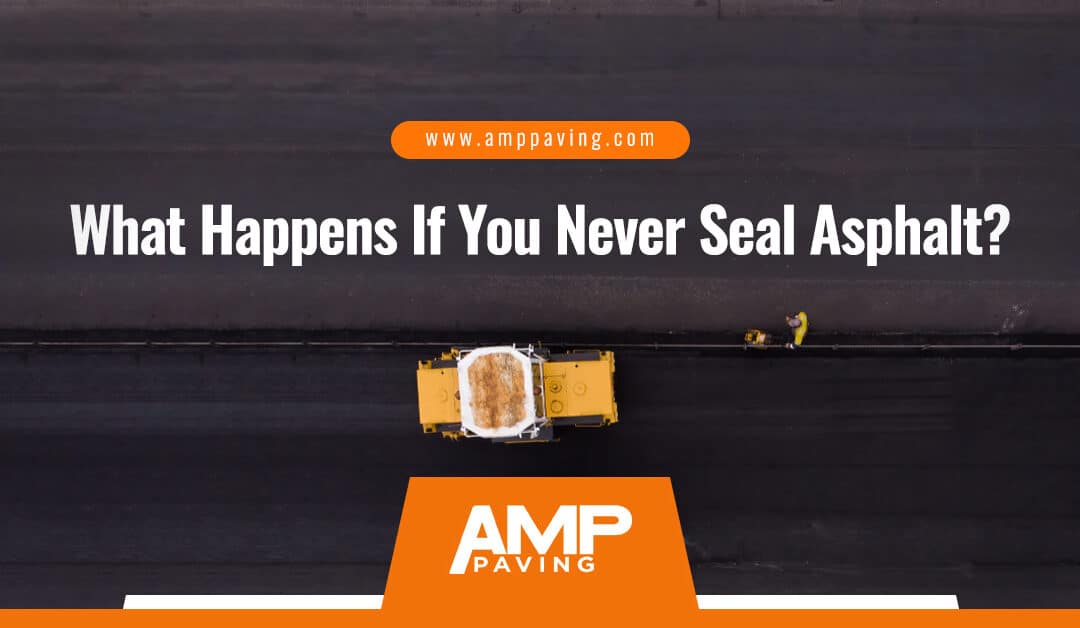The world of asphalt maintenance might not spark excitement at first, but trust us, it’s crucial for your driveway or parking lot’s longevity. Ever noticed how some surfaces crack and look worn out way too soon? That’s often because they missed out on a critical step—sealing. Now, you might wonder, “Do I really need to seal my asphalt?” or “What happens if I never seal asphalt surfaces?”
Especially here in Columbia, South Carolina, where our weather can be as unpredictable as a game of college football, taking care of your asphalt is not just a recommendation; it’s a necessity.
Let’s examine why sealing your asphalt needs to be priority. It’s all about protecting your investment, enhancing your property’s curb appeal, and avoiding unnecessary costs down the road. And hey, who doesn’t like saving money and keeping their property looking sharp?
Stick with us as we explore the aftereffects of skipping this essential maintenance task!
The Basics of Asphalt Sealing
Diving into the nitty-gritty of asphalt sealing might seem as thrilling as watching paint dry, but hear us out.
This stuff is the secret sauce to extending the life of your asphalt surfaces, whether we’re talking about your driveway, parking lot, or that little path that leads to your backyard oasis.
And let’s face it, nobody wants to shell out for expensive repairs if we can avoid them, right?
What Is Asphalt Sealing, Anyway?
Think of seal coating as sunscreen for your asphalt. Just like UV rays can damage your skin, they can also wreak havoc on your asphalt surfaces, making them brittle and faded.
A good seal coat acts as a barrier, protecting your asphalt from UV damage, oil leaks, and water penetration – all culprits of the dreaded cracking and potholes.
Why Seal Your Driveway or Parking Lot?
If you’ve ever looked at an unsealed driveway and thought, “Wow, that looks rough,” you’ve seen first-hand why sealing is a big deal.
Not only does it keep your asphalt looking new and boosts your curb appeal, but it also saves you money in the long run by preventing those costly and endless cycles of repairs.
Sealed surfaces are easier to clean, resist oil and gas spills better, and can even make your driveway less slippery in the rain.
When and How Often?
The timing of your seal coating is like catching the perfect wave; do it too soon, and it’s wasted effort, wait too long, and you’ve got a problem.
Asphalt needs to be fully cured before you seal it, usually a few months after installation. After that, sealing every couple of years should keep it in top shape, though heavy traffic areas might need a touch-up more frequently.
DIY or Call the Pros?
You might fancy yourself a DIY guru, but when it comes to seal coating, the devil is in the details.
From choosing the right grade of sealer to applying that thin coating evenly across your square foot of surface, there’s a lot that can go awry. Sealer companies exist for a reason, armed with the expertise and equipment to ensure your asphalt gets the protection it deserves.
Sealing your driveway or parking lot isn’t about adding unnecessary cost; it’s about investing in the future of your property.
With a bit of expert advice and timely maintenance, you can avoid falling into that never-ending cycle of cracks, potholes, and repairs. So, let’s seal the deal on protecting your asphalt and keeping it looking great for years to come.
Short-Term Consequences of Not Sealing Asphalt
So, you’ve decided to play the waiting game with sealing your asphalt. Maybe you’re thinking, “It’s just a driveway. What’s the worst that can happen?”
Well, let’s talk about the short-term consequences that can start to show up sooner than you might expect. Ignoring that seal coat isn’t just a gamble with your driveway’s looks—it’s a risk to its very structure.
Say “Welcome” to Cracks and Potholes
Without a protective seal, your asphalt driveway is like a knight without armor in the battle against the elements. Rain, sun, and even oxygen start to wear down the asphalt surface.
Before you know it, small cracks appear. These aren’t just unsightly; they’re the beginning of an endless cycle of damage. Water seeps in, freezes, expands, and voila—you’ve got yourself potholes.
Fading and Staining: The Aesthetic Downside
Let’s not forget about curb appeal. UV rays from the sun don’t just damage the asphalt’s structure; they fade that rich, black color to a dull gray. And without a seal coat to repel them, oil leaks from vehicles and other stains become a permanent feature of your driveway.
Not exactly the first impression you want to make.
The Slippery Slope to Repairs
A driveway or parking lot without sealant is more vulnerable to water damage.
Once the surface is compromised, moisture finds its way into the base layers, undermining the pavement’s integrity. This leads to more frequent and more expensive repairs.
Sealing your driveway can save you a bundle by cutting down on these costs.
Brittle in the Cold, Soft in the Heat
Temperature swings are no friend to unsealed asphalt. In colder months, the freeze-thaw cycle can turn small cracks into big problems.
Come summer, unsealed asphalt can actually become soft under the intense heat, making it more susceptible to damage under heavy traffic. It’s a year-round battle, and seal coating is your best defense.
Remember, these aren’t distant possibilities; they’re what you can expect in just the first few years after laying down your asphalt without a protective seal.
It’s not just about aesthetics; it’s about preserving the functionality and safety of your pavement. Taking action now with a quality seal coat can steer you clear of these pitfalls, ensuring your driveway or parking lot remains in top condition for years to come.
Long-Term Consequences of Neglect
So, what happens if you play the long game with neglect, never seal your asphalt driveway or parking lot, and just let nature take its course?
Spoiler alert: it doesn’t end well. Let’s look down the road a few years and see the kind of future your asphalt could be facing without that protective seal.
Cracks Grow Up to Be Potholes
Those small cracks we talked about earlier? They don’t stay small. Without regular sealing, moisture seeps in, freezes, expands, and then, as temperatures rise, contracts.
This cycle repeats year after year, widening those cracks until they graduate into full-blown potholes. And we’re not talking about the cute kind you might dodge on a leisurely drive; these can become axle-breakers.
The Unwelcome Mat: Advanced Surface Deterioration
Over time, the once smooth and inviting surface of your asphalt becomes rough and weathered. The vibrant black color fades under the relentless assault of UV rays, leaving your driveway or parking lot looking tired and worn.
This isn’t just an aesthetic issue; a deteriorated surface compromises the structural integrity of the asphalt, making it susceptible to all kinds of damage.
The High Cost of Waiting
Remember when we said sealing your driveway could save you money? Well, the flip side is that neglecting it can cost you—a lot.
Extensive damage means more than just filling in cracks or patching up a pothole here and there. We’re talking major repair jobs or, worse, a complete replacement.
That’s a hit to the wallet that could have been mitigated with some preventive maintenance.
Structural Failures: Beyond the Surface
The problems don’t stop at the surface. Without a seal to keep moisture out, water can penetrate deeper into the asphalt and affect the base layer. Once that happens, you’re looking at serious structural issues.
What started as a manageable problem can spiral into a scenario where the pavement might need to be completely dug up and relaid. This isn’t just expensive; it’s disruptive.
Your Driveway or Parking Lot’s Lifespan Shortens
Asphalt is tough, but it’s not invincible. Without regular sealing, its lifespan significantly decreases.
What could have lasted 20 or 30 years might only make it 10 to 15 before needing substantial work or replacement. Yikes!
For homeowners and property managers alike, that’s a far cry from the return on investment you were hoping for when your asphalt was first laid down.
A Little Maintenance Goes a Long Way
In the end, the message is clear: a little maintenance goes a long way. Sealing your asphalt might seem like a task you can keep pushing off, but as the years pass, the consequences of neglect become harder and more expensive to ignore.
Keeping up with regular sealing every 2-3 years isn’t just about maintaining appearances; it’s about protecting your investment and avoiding the long-term pitfalls that come from letting nature have its way with your asphalt.
We Can Help
At AMP Paving in Columbia, South Carolina, we understand the importance of protecting your asphalt investment. Sealcoating is not just a service we offer; it’s a preventative measure that saves you money and extends the life of your pavement.
Whether your asphalt is brand new or has been part of your property for years, adding a layer of sealcoating can shield it from the damaging effects of UV light, vehicle oils, and water—elements known to degrade asphalt over time.
Our sealcoating service is designed to significantly reduce the need for repairs by preventing damage before it starts. With a proper sealcoating maintenance plan, we can add up to seven more years to the life of your asphalt, making it less likely to crack and succumb to the wear and tear of daily use. Why consider expensive repaving when an affordable sealcoating application can do the trick?
We recommend scheduling sealcoating maintenance every 2 to 3 years to ensure the longevity of your asphalt investment. At AMP Paving, we’re committed to applying our seal coat correctly and efficiently, giving you the best possible results.
Don’t wait for the damage to occur. Protect your asphalt now and enjoy a smoother, more durable surface for years to come.
Call us today at 803-237-4563 or fill out our contact form for a free sealcoating quote on your next job. Let’s work together to keep your asphalt in prime condition, saving you time and money in the long run.

